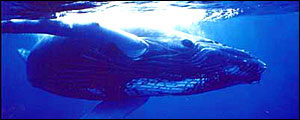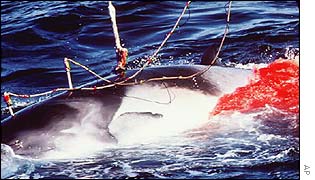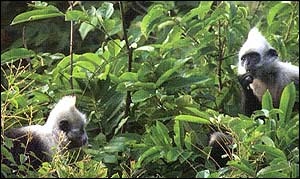The Terrain and Main Components of Debate
Week's Assigned Readings
 Full
Lecture - Week 4
Full
Lecture - Week 4[First Exercise - Due in Class - 20 October]
Class Research Resources and Assignments
Week 4
Selected
Writers on Environmental Ethics:
The Terrain and Main Components of Debate
Week's Assigned Readings

[First Exercise - Due in Class - 20 October]
|
|
"....But
man, proud man, Drest in a little brief authority, Most ignorant of what he's most assur'd, His glassy essence, like an angry ape, Plays such fantastic tricks before high heaven, As make the angels weep...." William Shakespeare |
| A number of thinkers and writers have contributed to the development of thinking about environmental ethics, and it is worth considering some of their specific contributions. What are the major traditions that have emerged or are currently taking shape in environmental ethics? What are the strengths and weaknesses of particular writers? Are writers from the past relevant today? What about the "received" ethical and religious traditions present in the world today? Some of the leading religious leaders have begun to focus upon the discussions of environmental ethics, but the role of religion in environmental matters has been a controversial one. Several years ago it seemed apparent to many historians of culture that the received traditions of religious belief in the Western World may have to be "rethought" in light of the need for a new kind of environmental ethics appropriate to our contempory world. In 1989 the Harvard Divinity School convened a conference on these matters, and numerous papers were prepared for discussion. Some of these papers outlined the tremendous task that lay ahead as a challenge for Western theologians if they hoped to make a significant contribution to the emerging field of environmental ethics. One of the papers presented at the conference, published by the Harvard Divinity Bulletin (1989), was entitled: '"While Angels Weep..." Doing Theology on A Small Planet.' (The Harvard Divinity Bulletin, XIX, 3 (1989). Another short paper that focused on the difficulty of overcoming culturally ingrained habits and structures of thought in the Abramic religions (Hebrew, Christian and Muslim religions) was publshed in the Harvard Divinity Bulletin in the following year. [see: "The Need for Miracles in the Age of Science," The Harvard Divinity Bulletin, XX, 2, (Summer 1900)].
|
Supplementary Case Study Material
|
The ethical dilemmas involved in the ivory
trade (consider comments in class) can highlight the problems of trying
to analyze the discourse of environmental ethics in general. A number
of different parties are clearly identifiable in the debates. For example,
it is possible to identify several voices from areas in which elephants
live including those from southern Africa, India, East Africa. In addition,
there are other parties to the debate that come from areas where no elephants
live at all, including conservationists in America and proponents of the
Convention on the International Trade in Endangered Species (CITES). There is no reason, of course, to limit this kind of debate to elephants and ivory. By extension, the environmental ethics of humankind's interaction with any other specific species can be approached in the same manner. In each case, it is possible to identify, analyze and evaluate the arguments involved, first by describing the parties in the debate and then assessing the ethical principles which are invoked by each party through an examination of their implicit theories of community, system, authority, agency, change and time. Elephants are a particularly charismatic terrestrial mammal, but what about the case of marine mammals? What would be an appropriate way to evaluate the environmental ethics of whale hunting? By way of practicing your analytical skills in environmental ethics, consider some of the following issues: |
||
| Should Inuits have the recognized right to kill whales? | Sunday,
13 October, 2002, 13:32 GMT 14:32 UK  Inuit demand whale catch By Alex Kirby BBC News Online environment correspondent A whaling dispute which is setting remote Arctic communities against the Japanese Government could soon be resolved. The International Whaling Commission (IWC) is holding a special meeting on 14 October to try to heal the rift. The future of about 80 bowhead whales and 50 minkes annually depends on the outcome. The IWC itself could be at risk if the meeting ends without a solution. Although a moratorium on commercial whaling has been in effect since 1986, the IWC has always allowed small communities, mainly in the Caribbean and the Arctic, to continue to catch a few whales. |
|
| Should any humans kill whales? |  Thursday,
6 June, 2002, 09:59 GMT 10:59 UK Thursday,
6 June, 2002, 09:59 GMT 10:59 UK Should whaling be permitted? Pro-whaling countries, led by Japan, are attempting to have a 15-year ban on commercial whaling lifted at this year's meeting of the International Whaling Commission (IWC). Anti-whaling campaigners scored an unexpected victory in the first vote to be taken at the conference, but support for the pro-whaling lobby is said to be building. The result of the vote meant that Iceland, which wants to see a return to commercial whaling, will now be excluded from joining the IWC. The UK Fisheries Minister, Elliot Morley, said the result was better than expected and a very good sign, but he cautioned that anti-whaling countries could face tougher resistance in their effort to maintain the existing global ban on whaling. Should whaling be permitted? What do you think will be achieved at the IWC meeting? |
|
| Friday,
24 May, 2002, 11:06 GMT 12:06 UK [What is a "god-given right?" Who says so? "God?" Whose "God?"] |
||
|
What about other species, marine or otherwise, that are not well known "charismatic megafauna" like elephants or whales? |
||
| For example, what about our "close relatives?" Do they deserve special "respect?" | Monday,
7 October, 2002, 17:01 GMT 18:01 UK  Third of primates 'risk extinction' By Alex Kirby BBC News Online environment correspondent One-third of the world's primate species now face a serious risk of extinction, according to a report by an international group of conservationists. They say the number of threatened species has risen sharply in the last three years. Primates living in two south-east Asian countries are said to be especially endangered. But several species are judged a little safer than they used to be. The report is entitled Primates In Peril: The World's Top 25 Most Endangered Primates. It is published by Conservation International (CI) and the primate specialist group of IUCN, the World Conservation Union. |
|
|
What if the species are not in fact "endangered?" Do we have the "right" to kill them anyway? |
||
| Why are so may people so intent upon the "right" to go fox hunting? How is intergenerational responsibility invoked in this debate? |
Sunday,
22 September, 2002, 15:01 GMT 16:01 UK Should those who go fox hunting have the right to forbid others from killing whales? |
|
|
What about the entire "list" of endangered species -- or for that matter -- those about whom we do not even know enough to place on a list? |
||
| Other species seem to face a "tough fight" for survival. Why is the "Red List" meaningful for environmental ethics?
|
Monday,
7 October, 2002, 23:35 GMT 00:35 UK Species face tough fight for survival By Alex Kirby BBC News Online environment correspondent A central Asian antelope, a camel and the Iberian lynx all face a high risk of extinction, scientists say. They are now classified by the International Union for the Conservation of Nature (IUCN) as critically endangered. Its updated Red List of Threatened Species says more than 11,000 creatures now face extinction. But two, an insect and a rodent, previously thought extinct, have been rediscovered. Since the last edition of the list two years ago, over 400 new species have been assessed. |
|
| Related Reading:
|
||||||||||||||||||||||||||||||